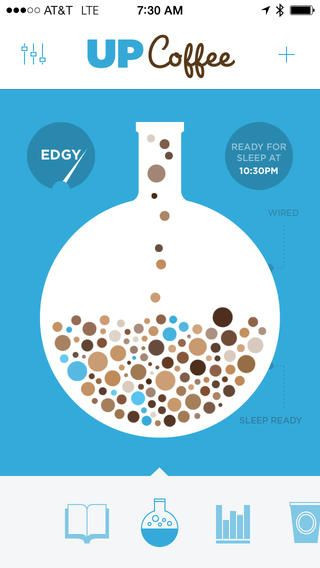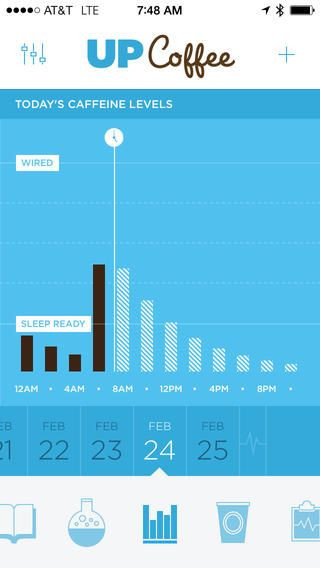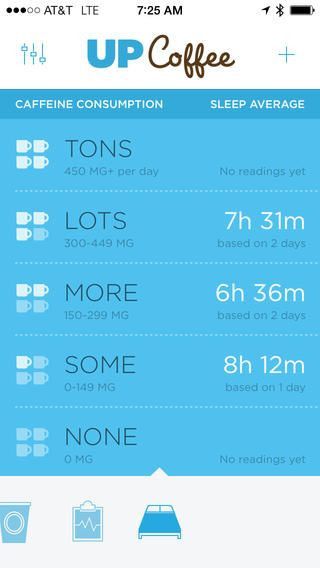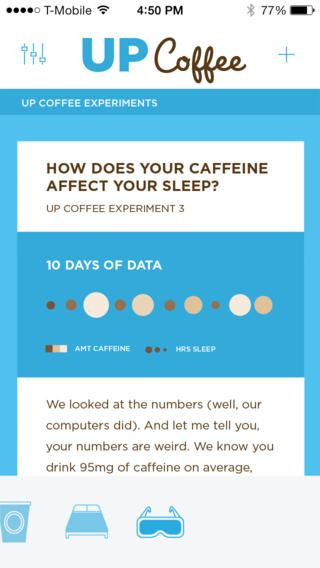'UP Coffee' App Measures Caffeine Consumption, Impact On Sleep: Could An App Help Treat Caffeine Addiction?

Most of us can’t start our mornings without a fresh cup of coffee to give us the java jolt we need to face the day. As the hours go by, a morning cup of coffee is followed by another during the afternoon and early evening, as we have evolved to become heavily caffeine dependent to get us through the day. Whether our limit is three cups of coffee, or six, we often find ourselves contemplating that last cup and wonder when our caffeine buzz will wear off — and should we indulge in another cup. Now it’s time to put our caffeine worries aside because there’s an app for that: “UP Coffee.”

“With billions of people around the world enjoying coffee, tea, and other caffeinated drinks each day, the UP Coffee app delivers daily insights with new information on caffeine that’s relevant to you,” said Jawbone Labs, the developer of the app, in the press release. The firm says the Jawbone app works with or without the company’s UP24 wristband. UP Coffee aims to help users understand more about their caffeine choices and relates that to caffeine consumption, and the users' expected sleep time.

Users will first log in their gender, height, weight, sensitivity to caffeine, and their goal bed time. Coffee, tea, energy drinks, or another caffeinated beverage in UP Coffee will tell users where they fall on a scale of “Edgy,” “Wired,” and “Sleep Ready.” A giant beaker on the screen fills up with every caffeine-filled beverage the user consumes, according to the Daily Mail. The app can analyze every individual’s caffeine intake and sleep for ten days when data is linked from the user’s UO or UP24 band. After caffeine intake and sleep is analyzed, UP Coffee will tell users the amount of sleep on average they lose for every 100 milligrams of caffeine they ingest. It can also tell app users how much caffeine is in a cup of, for example, decaf coffee, or the size of a Diet Coke, or Dunkin Donuts coffee.
If users think they are overdoing shots of caffeine, UP Coffee will ask if they are positive they want to have that extra cup or two, or three. It's therefore possible the app may help tackle one of America’s biggest problems: sleep deprivation.

According to the Centers for Disease Control and Prevention, 35 percent of American adults report getting less than the recommended seven to eight hours of sleep each night. Caffeine can have a significant effect on a person’s sleeping patterns and may make them feel more alert by blocking sleep-inducing chemicals in the brain — melatonin — and increasing adrenaline production. Once it enters the bloodstream through the stomach and the small intestine, it can have a stimulating effect as soon as 15 minutes after it is consumed. It takes about six hours for one half of the caffeine to be eliminated from the body.

Whether you have three 8-ounce cups of coffee, or six or more per day, even moderate doses can cause rapid heartbeat, sleep disturbance, and a caffeine crash once the effects wear off, says the Mayo Clinic. Users are also more susceptible to prolonged sleep latency, shorter sleep time, increases in light sleep and shortening of deep sleep time, and frequent awakenings. The effects caffeine has on sleep is not only contingent on caffeine consumption at bedtime, but also caffeine consumption during the day.
UP Coffee is available for free for the iPhone, but Jawbone affirms there is an Android edition in the works.



























